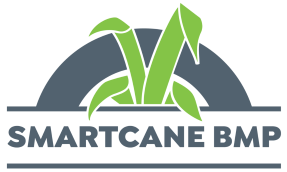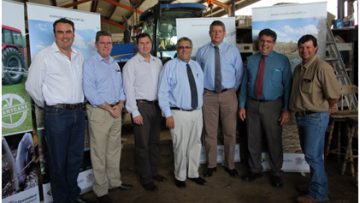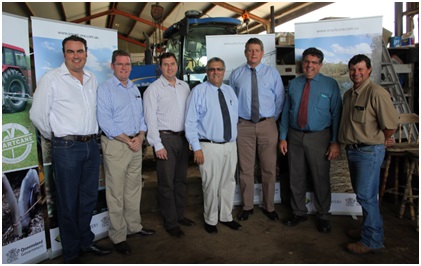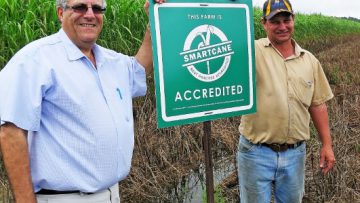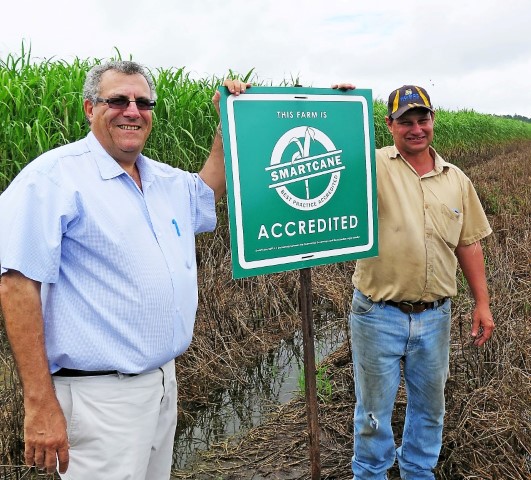Having completed the three core modules of Smartcane BMP, Cairns Region grower Stephen Calcagno wants the public to get a new understanding of the respect farmers have for Queensland’s unique World Heritage assets. He believes the best way for that to happen is through farmers supporting the industry-driven best management practice program to accreditation.
“I’ve been here all my life,” Stephen says. “I’ve seen no deterioration in creeks, I’ve seen them actually thriving. We’ve changed a lot over the years and farmers have got really proactive.”
Stephen believes Smartcane BMP is the best tool farmers have at their disposal to prove that they are minimising the loss of nutrient, pesticide and sediment into the Great Barrier Reef catchment. “The more who do it, the more it puts our industry in a favourable light with the community. We’ve got to prove to everyone that we’re doing the right thing by the reef.”
Good drainage management is crucial for Stephen in his high rainfall environment and riparian zones, silt traps and grassed headlands slow water flow keeping nutrient, herbicide and sediment on his farms. Stephen keeps accurate records of activities such as nutrient applications and cultivation with the GPS on his farm machinery downloading events onto a computer program and he’s two years into a process of switching his farms over to a single-row 1.8 metre controlled traffic farming system which is reducing soil compaction and the potential for erosion.
“If you can fix up the soil health then you’ll have the optimum take-up of nutrients, a healthy root system and healthy plant that’ll utilise the nutrients that you’ve put in and will minimise any loss running off,” Stephen says.
Nutrients are applied using the Six Easy Steps principles and placed sub-surface with a stool-splitting fertiliser box.
As Stephen sees it, there’s much at stake for growers given the importance of a productive, profitable and environmentally sustainable sugar industry to the Queensland’s regional economy. “Everyone makes an impact, it’s just trying to minimise the impact that you do make,” he said. “At the end I’ve still got to run a productive business for the sake of me, for the sake of the towns because financially, even if I’m not making money the farmers are keeping a lot of the towns up and down the state going, keeping people in jobs and money turning over.”
“I’ve been here all my life,” Stephen says. “I’ve seen no deterioration in creeks, I’ve seen them actually thriving. We’ve changed a lot over the years and farmers have got really proactive.”
Stephen believes Smartcane BMP is the best tool farmers have at their disposal to prove that they are minimising the loss of nutrient, pesticide and sediment into the Great Barrier Reef catchment. “The more who do it, the more it puts our industry in a favourable light with the community. We’ve got to prove to everyone that we’re doing the right thing by the reef.”
Good drainage management is crucial for Stephen in his high rainfall environment and riparian zones, silt traps and grassed headlands slow water flow keeping nutrient, herbicide and sediment on his farms. Stephen keeps accurate records of activities such as nutrient applications and cultivation with the GPS on his farm machinery downloading events onto a computer program and he’s two years into a process of switching his farms over to a single-row 1.8 metre controlled traffic farming system which is reducing soil compaction and the potential for erosion.
“If you can fix up the soil health then you’ll have the optimum take-up of nutrients, a healthy root system and healthy plant that’ll utilise the nutrients that you’ve put in and will minimise any loss running off,” Stephen says.
Nutrients are applied using the Six Easy Steps principles and placed sub-surface with a stool-splitting fertiliser box.
As Stephen sees it, there’s much at stake for growers given the importance of a productive, profitable and environmentally sustainable sugar industry to the Queensland’s regional economy. “Everyone makes an impact, it’s just trying to minimise the impact that you do make,” he said. “At the end I’ve still got to run a productive business for the sake of me, for the sake of the towns because financially, even if I’m not making money the farmers are keeping a lot of the towns up and down the state going, keeping people in jobs and money turning over.”
